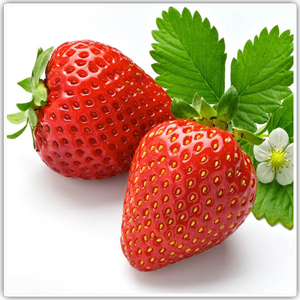The group investigates the mechanisms involved in the activation and/or suppression of the defense response to biotic and abiotic stresses in plants.
We intent to identify the participating molecules and to understand the interaction occurring among them, that regulate the biochemical signals involved in the activation of the innate immunity of plants exposed to a pathogen or to an abiotic stress.
In our studies we use strawberry as the model plant and the pathogens associated to the anthracnose (Colletotrichum sp.) and the gray mold (Botrytis cinerea), diseases. However, we also include in our studies other species such as Arabidopsis and tobacco.
1. Studies of the signaling of the plant defense response to biotic and abiotic stresses.
In this line we investigate the mechanisms and molecules involved in the activation and signaling of plants to different types of stresses.
To evaluate the response to biotic stresses we use strawberry plants and biotrophic and necrotrophic pathogens of this plant species. For the abiotic stresses we investigate the response of strawberry plants to drought, salinity, and soft mechanical stresses (SMS). Molecular and biochemical markers associated to these stresses are evaluated.
2. Innate immunity activation mediated by elicitores of different origins.
In our studies we use innate immunity elicitors of different origins in strawberry, Arabidopsis and other plant species. Currently we are studying the effect of an elicitor obtained from a local isolate SS71 of the fungus Acremonium strictum. We are evaluating biochemical and molecular markers associated to the defense response observed.
3. Mechanisms of the defense response suppression.
We investigate the suppression of the defense response mediated by a suppressor molecule produced by the local isolate M11 of the fungus Colletotrichum acutatum. We pretend to understand the molecular strategy by mean of which the suppressor halts the activation of the innate immunity of plants.
Biotic and abiotic stresses are carried out in a special facility destined to expose strawberry plants (or other species) to pathogens, or abiotic stresses such as drought, salinity, temperature, etc. The stress lab is equipped with adequate lighting and temperature facility that permits to set and precise temperature, and light intensity and cycle as required in each particular experiment.
- Díaz Ricci, J.C.; L. Regan and J.E. Bailey.(1991). Effect of the alteration of the pathway of acetic acid synthesis on the fermentation pattern of Escherichia coli. Biotechnol.Bioeng. 38 : 1318-1324. ISSN 0006-3592.
- Kirschvink, J.L.; Kuwajima, T.; Ueno, S.; Kirschvink, S.T.; Díaz Ricci, J.C.; Morales, A; Barwig, S. and Quinn, K.J. (1992). Discrimination of Low-frequency Magnetic Fields By Honeybees: Biophysics and Experimental tests. J. General Physiol., Supplement on Sensory Transduction, 45th Annual Symposium D.Corey and S.Roper Eds., Vol: 47, Chap 14, pp.225-240. ISSN 0022-1295.
- Díaz Ricci, J.C. and Hernández, M.E., (2000). Plasmid Effects on Escherichia coli Metabolism. Critical Rev. Biotechnol. 20(2) : 79-108. ISSN 0738-8551.
- Vellicce, G.; Diaz Ricci, J.C.; Hernandez Garcia, L and Castagnaro, A. (2006). Enhanced resistance to Botrytis cinerea mediated by the transgenic expression of the chitinase gene ch5B in strawberry. Transgenic Res. 15(1):57-68. ISSN:0962-8819.
- Mamaní, A., Filippone, M.P., Grellet, C., Welin, B., Castagnaro, A.P., and Díaz Ricci, J.C.. (2012). Pathogen-Induced Accumulation of an Ellagitannin Elicits Plant Defense Response. Molecular Plant Microbe Interaction. 25(11): 1430- 1439. ISSN 0894-0282.
- Chalfoun, N.R.; Grellet-Bournonville, C.F; Martínez-Zamora, M.G.; Díaz-Perales, A; Castagnaro, A.P. and Díaz Ricci, J.C. (2013). Purification and Characterization of AsES: a Subtilisin Secreted by Acremonium strictum is a Novel Plant Defense Elicitor. Journal of Biological. Chemistry 288 (20): 14098-14113. ISSN 0021-9258 (print); Online ISSN 1083-351X (Online).
PUE 0104. “Biological strategies to add value to agro-food of interest from the NOA region”. Director: Juan C. Díaz Ricci. 2017-2022.
PICT 0653. “Studies of the innate immunity activation mechanisms mediated by elicitor of microbial origin in strawberry”. Director: Dr. Juan C. Díaz Ricci. 2018-2020.
PIUNT D642 “Studies of the innate immunity activation mechanisms mediated by the protein AsES in strawberry”. Director: Juan C. Díaz Ricci y Co-director: Atilio P. Castagnaro. 2018-2021.
PICT 0050. “Biological strategies to add value to the agro-food of interest from the NOA region”. Director: Juan C. Díaz Ricci. 2018-2020.
Principal Researcher, CONICET
email: juan@fbqf.unt.edu.ar
Assistant Researcher, CONICET
email: fernandagm@hotmail.com
College Professor – UNT
email: urusulatonello@fbqf.unt.edu.ar
Assistant Technician, CONICET
email: sergio_alvarez_44@hotmail.com
Principal Professional, CONICET
email: mcecilialemme@hotmail.com
Principal Professional, CONICET
email: mgmartinezzamora@fbqf.unt.edu.ar
INTA – EEA Famaillá
email: salazar.sergio@inta.gob.ar
College Professor – FAZ – UNT
email: rpedraza@herrera.unt.edu.ar
CONICET
email: v.hael.conrad@hotmail.com
CONICET
email: ggmartos@gmail.com
CONICET
email: mariadelpilar1026@hotmail.com
CONICET
email: juli2491.e@gmail.com
BECA AGENCIA
email: fernandorequena@hotmail.com.ar
CONICET
email: ro_tomasgrau@hotmail.com
CONICET
email: marisaperato815@hotmail.com



